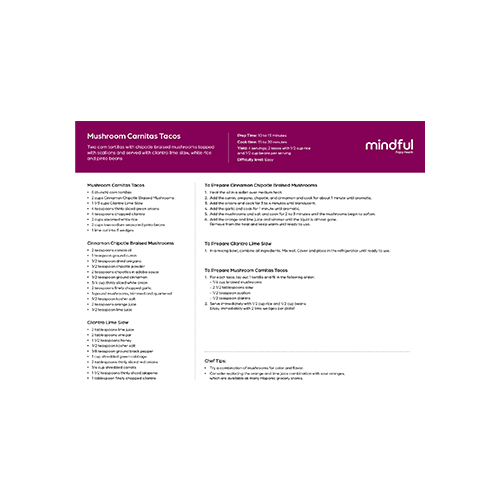Nourishing Your Mind: Plant-Rich Eating and Brain Health
Plant-forward diets offer various health benefits and are becoming increasingly popular for sustainable eating. One area of growing interest is the link between plant-based and plant-rich eating and brain health. Studies suggest dietary choices can significantly affect our cognitive function, mood and overall mental well-being. Let’s explore how eating more plants can promote brain health and discover valuable tips for integrating more powerhouse foods into your diet.
The Science Behind Plant-Rich Diets and Brainpower
Research indicates that diets high in fruits, vegetables, whole grains, nuts and seeds — known as plant-rich, plant-forward or plant-based eating — can positively impact brain health. These foods are packed with essential nutrients, antioxidants and healthy fats, vital for maintaining cognitive function and preventing neurodegenerative diseases as we age. They can:
- Reduce Inflammation: Fruits and vegetables are rich in antioxidants, which help combat oxidative stress and inflammation — two factors linked to cognitive decline. For example, berries are high in vitamin C and polyphenols, which can improve memory and cognitive function. Dark leafy greens like spinach and kale provide essential vitamins such as vitamin K, which supports brain health.
- Support Brain Function: Plant sources such as flaxseeds, chia seeds and walnuts offer Omega-3 fatty acids, which support brain structure and function, potentially lowering the risk of dementia.
- Boost Mood and Cognitive Health: Emerging research indicates a strong connection between gut and brain health. A plant-rich diet is loaded with fiber and promotes a healthy gut microbiome. Fermented plant foods like sauerkraut, kimchi and yogurt made from almond or coconut milk can further enhance gut health, leading to improved mood and cognitive function.
The Impact on Mental Health
A plant-rich diet supports cognitive function and can also profoundly impact mental health. Studies show that individuals who eat more plant-based meals report lower levels of anxiety and depression. The vitamins and minerals in these foods, including B vitamins, magnesium and antioxidants, play a crucial role in regulating mood and emotional well-being.
Depression is a modifiable risk factor for dementia, leading to changes in brain structure and function that increase cognitive decline. Adopting a plant-rich diet packed with antioxidants and anti-inflammatory compounds may help improve mood and overall brain health, potentially reducing the risk of developing dementia.
Practical Tips for Adopting a Plant-Rich Diet
Here are some tips on how to start a plant-based diet and reap its brain health benefits:
- Start Slow: Transitioning to a plant-rich diet is not a race. You can start by incorporating one or two vegetarian meals into your week and gradually increase as you become more comfortable. It's a journey, and you're in control of the pace!
- Try New Recipes: The world of tasty plant-based meals is vast and exciting. Explore global cuisines and try different fruits, vegetables, legumes and whole grains. Choosing seasonally grown, local produce reduces transportation emissions and supports your community. Click here to try this delicious Mindful Mushroom Carnitas Tacos recipe.
- Focus on Whole Foods: Aim to consume whole, minimally processed foods. These foods for brain health are more nutritious and satisfying, helping you maintain stable energy levels throughout the day.
- Snack Smart: Replace processed snacks with whole plant options like nuts, seeds, and hummus, and enjoy them with vegetables or fruit. These options are both delicious and beneficial for your brain.
- Stay Hydrated: Drinking water and consuming hydrating fruits and vegetables can help maintain optimal brain function. Use a reusable water bottle to avoid excess plastic waste.
Conclusion
Embracing a plant-rich diet can be a powerful way to take control of your brain health and overall well-being, while also reducing your environmental impact. By nourishing your body with various plant foods, you can support cognitive function, boost your mood, and potentially reduce your risk of neurodegenerative diseases, including dementia. Whether you’re fully committed to plant-rich eating or just looking to incorporate more fruits and vegetables into your meals, the benefits for your brain are clear.
Enjoy more plants today — your mind (and the planet) will thank you!

